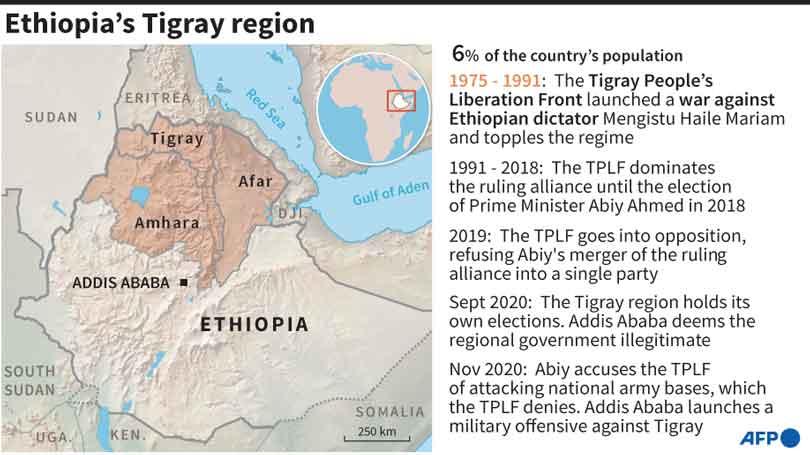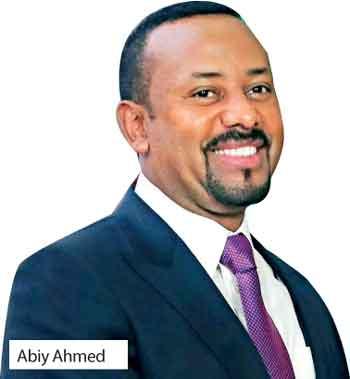Reply To:
Name - Reply Comment

 In December last year, Abiy Ahmed, Ethiopia’s new Prime Minister and Africa’s youngest won the Nobel Peace Prize for his role in courting peace with former foe, Eritrea and thus ending the Horn of Africa’s longest-running war.
In December last year, Abiy Ahmed, Ethiopia’s new Prime Minister and Africa’s youngest won the Nobel Peace Prize for his role in courting peace with former foe, Eritrea and thus ending the Horn of Africa’s longest-running war.
Barely a year since then, Ethiopia is back in the thick of another war, that has already sent 20,000 refugees across the border to Sudan, and reports of ethnic massacres are trickling in. Grave enough, but these personal tragedies are mere footnotes of a greater catastrophe for this is a zero-sum war that if the central government fails to prevail in, would most likely lead to the disintegration of Ethiopia, Africa’s second-most populous state along tricky ethnic lines.
Abiy’s new enemy is Tigray People’s Liberation Front (TPLF) which was the dominant party of the ruling Ethiopian People’s Revolutionary Democratic Front (EPRDF) until Abiy’s elevation as the Prime Minister in 2018. The TPLF withdrew from the government after Abiy merged ethnic-based regional parties into a single party, known as Prosperity Party and when the Central Government postponed regional and national elections this year under the pretext of Covid, it went ahead and held its own election in its home turf, Tigray region which is home to six million people, and refused to accept the legitimacy of the Central Government, which in its part announced the regional election as void. The immediate catalyst for the war was an attack on the garrison of federal troops in the Tigray region by TPLF and it led to the Centre to declare war.
In Sri Lanka, pundits have advocated devolution of police power as if it is just another form of administrative power, which it isn’t
Many observers have pinpointed a wide range of causes for Ethiopia’s recent troubles – most of which had long persisted and are structural. But the most obvious of all is the weak foundation of the Ethiopian State on ethnic federalism, which pits the Centre against competing for ethnic-based parties and groups in the region.
In 1991, a motley group of parties led by TPLF defeated Derg, the pro-Soviet military Junta that ruled Ethiopia since it overthrew the long-standing emperor Haile Selassie in 1974. TPLF converted the centralised state of Ethiopia into a federal ( in theory, a con-federal) state with nine regional states based on ethnicity and two federally administered areas. The new constitution was hailed for its promotion of ethnic and cultural exclusivity, though Ethiopia has never had competitive multi-party elections to test these claims. Instead, unelected or appointed ethnic elites ruled the roost in the regions and as long as they remained subordinate to the Centre, none of that mattered.
In the meantime, Ethiopia, which was earlier known for its devastating famine in the 80s. charted a commendable economic journey, and become one of Africa’s fasted growing states; especially since the dawn of this century, its economy has clocked near double-digit growth annually.
 With relative prosperity and social media, long-suppressed ethnic grievances came to surface as Oromo and Amhara, the largest and second-largest ethnic groups resented the control of Tigrayan elite which accounted for just six per cent of the population. Their protests provoked a military crackdown but ultimately resulted in the change of power from the Trigrayan old guard to MrAbiy who is of mixed Oromo and Amhara origin.
With relative prosperity and social media, long-suppressed ethnic grievances came to surface as Oromo and Amhara, the largest and second-largest ethnic groups resented the control of Tigrayan elite which accounted for just six per cent of the population. Their protests provoked a military crackdown but ultimately resulted in the change of power from the Trigrayan old guard to MrAbiy who is of mixed Oromo and Amhara origin.
Since becoming Prime Minister, Mr Abiy had undertaken ground breaking democratic reforms, and released political prisoners and invited exiled groups back to Ethiopia. However, his democratic experiment was punctured by growing ethno-nationalism in the regions and ethnic unrest which had internally displaced nearly three million people in various parts of the country even before the start of the new phase of the conflict. Now he faces the acid test of not just democratic reforms, but the survival of the Ethiopian State.
For anyone interested in constitutionalism and nation-building, Ethiopia is a classic reminder of how a state should not be structured. That is especially a useful lesson for Sri Lanka, where constitutional pundits and their foreign funders have advocated constitutional solutions as extensive as confederalism- remember those heydays of the peace process when some experts argued the eventual solution as one that leads to the existence of two armies, one of the LTTE and the other of the Central Government.
In Ethiopia, its federal constitution goes as fas as granting self-determination to the extent of cessation. Quasi-military police units which were set up by regional governments to lead counter-insurgency campaigns have become formidable military forces capable of fighting frontal wars.
In Sri Lanka, pundits have advocated devolution of police power as if it is just another form of administrative power, which it isn’t. In a power maxi-maxing ethnic set up, police powers granted to the provincials can easily turn sour. Worse still in Sri Lanka, where successive governments have been reactive, and would likely to wait until the problem explodes on its face. A functional state can not be constituted if there are competing elements in the periphery that competes with the centre. The system in Ethiopia worked until the regional elites were beholden to the Centre. After Abiy took the gene out of the bottle through his democratic experiment, the entire system is now at the mercy of the centrifugal forces of ethnic federalism.
Sri Lanka is not as ethnically diverse as Ethiopia which has 80 recorded ethnicities. However within our own ethnic and demographic diversity, it has proven repeatedly, the real threat to Sri Lanka as a functional state has always being within. How these disparate groups to be accommodated within the unified national agenda had caused dilemma since the independence. However much of that uncertainty has since been resolved not so much by negotiation and peaceful engagement , but by the brute force. The JVP which waged two insurgencies, and was subdued by a brutal counter-insurgency campaign is now firmly in the political mainstream. Tamil elites would eschew another reckless gambling as long as the retributive cost of the previous one remains in their memory. Easter Sunday attacks were not representative of the wider Muslim community, but the growing Wahhabist fundamentalism and Arabization of the community is a hard fact, and the post-Easter attack scrutiny would contain these forces as long as future governments do not throw the caution to the wind.
Sri Lanka can not be peaceful, nor prosperous without a strong- centralised government. Any form of devolution or decentralisation should not have competing power centres. If you violate this basic premise, the new status quo would only be established by war.
Nor can Sri Lanka grow prosperous without a centralised state capable of delivering its writ and development. If you want a template as to how power sharing be used to leapfrog economic development, the best example is not India or Switzerland, but China, which is not a federal state by any means. China is a strong centralised state with a hierarchical structure of power, which has distributed administrative powers to its provinces, which have provincial budgets larger than middle –sized- nation states. Its provincial governments might be laws unto themselves within their provinces, but ultimately beholden to the Centre in Beijng, which can decide, virtually the life and death of its provincial authorities.
Sri Lanka is not a party state, which China is, but in practice, whenever a new party is elected to power in the centre, provincial councils follow suit in the next election. North is an outlier, but, some kind of consensus politics can be tried out.
Ethiopia is not the only warning. Earlier the protests in Catalonia revealed how federalism, when poised on ethnicity, becomes an extremely polarising force even in developed states. President Gotabaya Rajapaksa is right when he eschews further devolution, especially into police and land powers. But he is wrong to attribute that to Sinhala majority’s opposition to devolution. The stubborn fact is that ethnically driven devolution does not solve the problem. It postpones the problem so that it could explode one day in the future when the nation is least prepared to face it.
Follow @RangaJayasuriya on Twitter